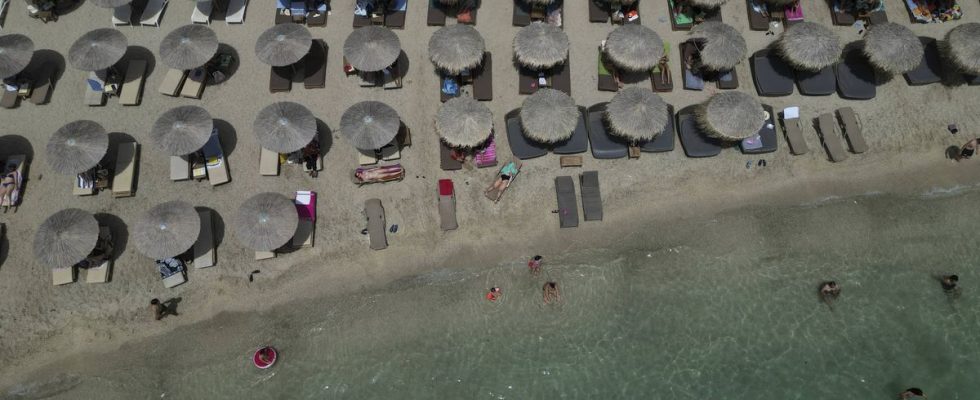The Greeks demand access to their beaches. Often hampered by the proliferation of sun loungers and umbrellas, many have become private. Citizens have mobilized to demand “free access” to the beaches. Under their pressure, the Greek authorities have recently stepped up controls on the country’s coasts, crowded with holidaymakers at the peak of the tourist season.
Started in Paros, a Cycladic island in the Aegean Sea where the real estate sector is in full development, this movement quickly gained momentum and forced the government and local authorities to multiply the inspection of the authorizations of companies active on the beaches. “The violation of the law on the establishment of businesses by the sea is recurrent, but this summer the problem has worsened and thanks to the citizens’ movement, controls have been intensified,” Markos Koveos told AFP. mayor of Paros, reached by telephone.
A free space equal to 50% of the surface of the beach
According to Greek law, companies or beach bars near the coast must leave a free space equal to at least 50% of the surface of the beach, to guarantee access to the sea.
A photo posted on social networks showing the gathering of 250 citizens at the end of July on a beach in Paros brandishing a banner with the inscription “Reclaim the beach” (reclaiming the beaches, editor’s note) has gone viral. Since then, many photos and videos showing beaches invaded by deckchairs at “often exorbitant prices”, according to social network users, have invaded social networks.
“Free beaches” trending on X
The hashtag “kinima petsetas” (the beach towel movement, editor’s note) or “free beaches” (free beaches, editor’s note) has become one of the first trends on Twitter, renamed X. “We want public spaces, like those by the sea, are free, accessible, free and clean. Nothing less”, summarizes on X the collective of “Active Citizens”.
Sporadic mobilizations have taken place in recent weeks on the islands near Paros, Mykonos and Naxos, but also in Crete (south) and in seaside resorts on the mainland of Chalkidiki (North) to the beaches of Attica, the Athens region. Justice also intervened at the beginning of August: the prosecutor of the supreme court Georgia Adilini asked the public prosecutor’s office of Syros, capital of the Cyclades, to control “access to common areas” such as the coasts, safeguarded by the Greek constitution.
“Illegal” occupation of beaches
In the event of a violation of the law, town halls must report the problem to the Ministry of Finance, the competent body for granting authorizations to beach businesses and imposing fines, recalls Markos Kovaios. The union of town halls in Greece recently asked the government to transfer all beach control powers to local authorities so that the application of the law is more effective.
According to public television Ert, three managers of a beach bar in Laganas, a tourist beach on the island of Zante in the Ionian Sea (West), were recently arrested for lack of authorization to install parasols.
Last week the Ministry of Finance increased checks on the Cycladic islands and three managers of tourist companies in Naxos were arrested in flagrante delicto for “illegal” occupation of the beaches.
A political turn
“A guide for indignant bathers” was published this weekend on the Inside Story investigation site, describing as “a paradox the fact that the citizen plays the role of controller of the authorities” and not the reverse.
In Paros, the controversy has taken a political turn in view of the local elections next October in Greece. Markos Koveos, who is seeking a third term, wonders “why this movement has grown so much this summer” when the violations on the beaches date back “decades”.
For its part, “the popular rally” of Paros, a local opposition movement, accuses the town hall of having “underestimated the problem at the beginning” and welcomes “the initiative of the citizens of Paros, who is widespread across the country” to protect the obvious right “to free access to beaches”.

